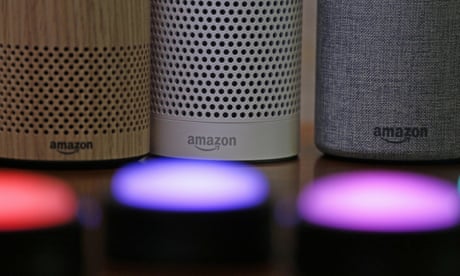- by foxnews
- 10 Mar 2025
Voice assistants could ‘hinder children’s social and cognitive development’
Voice assistants could ‘hinder children’s social and cognitive development’
- by theguardian
- 01 Oct 2022
- in technology

From reminding potty-training toddlers to go to the loo to telling bedtime stories and being used as a "conversation partner", voice-activated smart devices are being used to help rear children almost from the day they are born.
But the rapid rise in voice assistants, including Google Home, Amazon Alexa and Apple's Siri could, researchers suggest, have a long-term impact on children's social and cognitive development, specifically their empathy, compassion and critical thinking skills.
"The multiple impacts on children include inappropriate responses, impeding social development and hindering learning opportunities," said Anmol Arora, co-author of an article published in the journal Archives of Disease in Childhood.
A key concern is that children attribute human characteristics and behaviour to devices that are, said Arora, "essentially a list of trained words and sounds mashed together to make a sentence."
The children anthropomorphise and then emulate the devices, copying their failure to alter their tone, volume, emphasis or intonation. Another issue is the machines' lack of automatic expectation for children to say please or thank you.
Devices are also limited in the types of questions they can respond to. "As a result, children are going to be learning very narrow forms of questioning and always in the form of a demand," said Arora, a researcher at the school of clinical medicine at Cambridge University.
There are also problems with recognising different accents. "If a child is particularly young, they might well not be able to pronounce particular words properly and then there's a risk their words might be misinterpreted and they're exposed to something inappropriate," he said, citing an example where a 10-year-old girl was exposed to an online challenge where she was told to touch a live electric plug with a coin.
"These devices don't understand what they're saying," he said. "All they're doing is regurgitating some information in response to a narrow query, which it might have misunderstood anyway, without any real understanding of safety or who's listening to it."
"At the moment, these devices are very primitive because the people who develop them don't care about human interaction or their impact on children's development," he said.
"They know how adults use these devices but the way children use them, and the impact they have on children, is very different," he added. "We need a lot more research, as well as ethical guidelines for their use by children"
But Dr Caroline Fitzpatrick, the Canada Research Chair in Digital Media Use by Children and Its Implications for Promoting Togetherness: An Ecosystemic Approach, said she thought there was little cause for concern.
"It's true that children need rich context and cues to learn and develop vocabulary which at present, they can't get through interactions with technology because it only provides very minimal information and tools and context," she said.
"A child who was already timid or who spent too much time on their device might develop lower quality social skills and social competence than their peers, as well as difficulty using basic politeness formulations and poor non-verbal communication skills - such as interrupting and not making eye contact," she said. "Those children would have lower quality relationships with their peers, teachers and family members and increased social isolation.
"But as long as parents keep to the recommended limits for children, and they're getting a healthy amount of interaction from their caregivers and peers, then I don't think there should be cause for alarm," she added.
- by foxnews
- descember 09, 2016
Ancient structure used for cult 'rituals' discovered by archaeologists
A Neolithic Timber Circle was discovered by archeologists in Denmark resembling the historical landmark Stonehenge in the U.K. It is open to be viewed by the public.
read more





